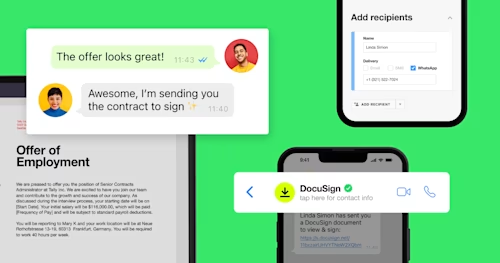
Publicaciones populares
Prioridades en ciberseguridad para 2026: consejos para CEOs y CISOs
A medida que las amenazas de seguridad se aceleran, los líderes deben replantear su enfoque reconociendo la identidad como una superficie de ataque crítica, utilizando la IA de manera responsable y pasando de los informes reactivos a la prevención proactiva.


Descubre cómo crecen las organizaciones con Docusign
Publicaciones recientes
Estrategias e insights sobre acuerdos, enviados directamente a tu bandeja de entrada
Docusign IAM: la plataforma de acuerdos que tu negocio necesita

















